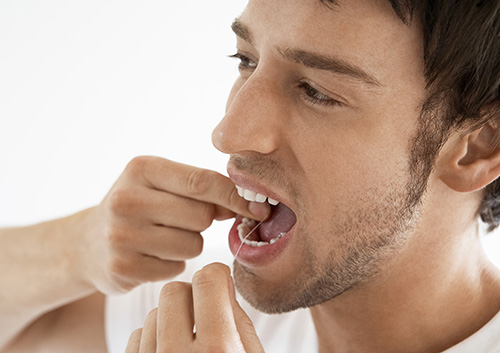April 26th, 2023

The short answer to this question? Yes. Because your child’s breath is a reflection of his or her oral health, you should talk to Dr. Chad Vanourny if you notice any unpleasant changes. While better dental hygiene is usually the answer for young children, bad breath can also be a symptom of more serious problems.
Oral Hygiene
Most often, bad breath is simply a sign that your child needs a little help developing proper brushing and flossing habits.
- Show your child how to use a soft-bristled brush that fits in the mouth comfortably, be sure to brush all the surfaces of each tooth, and don’t forget to angle toward the gum line. And brush long enough. Once all the baby teeth have arrived, two minutes of brushing is usually recommended for children.
- It’s not too early to floss! Adults need to handle the flossing duties for children until they can manage on their own, so it’s a perfect time to teach technique. And, just like toothbrushes, floss should be flexible and soft.
- Don’t forget the tongue. Our tongues harbor the bacteria that cause bad breath, so finish off your child’s routine with a gentle brush of the tongue.
Better oral habits mean not only fresh breath, but give those baby teeth the best chance of staying healthy until they are naturally replaced by adult teeth. After all, baby teeth not only help your child learn to eat and speak properly, but they act as necessary placeholders so the permanent teeth are able to erupt in exactly the right spot.
Talk to a member of our Charlotte office team at your child’s next appointment if you are concerned about oral hygiene–they have many great suggestions for making brushing and flossing more efficient, comfortable, and even fun for your child.
April 25th, 2023

Planning a wedding can be a highly stressful time. Dr. Chad Vanourny and our team want to support you in this process by helping you achieve a beautiful, bright smile. Wedding days entail a lot of photographs that will last a lifetime. We know how crucial it can be that you have a smile that makes you feel confident throughout this memorable day.
Whether you’re the bride or groom, a member of the wedding party, or just a guest, a teeth-whitening treatment from Dr. Chad Vanourny can give you extra confidence. Even when you’ve made the proper effort to keep up your oral health routine, staining still can appear on your teeth from foods and beverages over time. You can do several things to make sure your smile is in top shape before a wedding.
Our in-office whitening treatment is a good option if you’re looking for an investment that can last. If you’ve tried whitening kits on your own, you may have noticed they have to be used frequently to maintain the bright smile you desire.
Professional whitening treatments done by Catawba Valley Dental Care are quite comfortable and have long-lasting effects. You can also use whitening toothpaste and mouthwash to keep your teeth bright between in-office whitening treatments.
Our staff can also provide helpful advice on how to avoid staining between your whitening treatment and the big day. If you’re concerned that you may have to hold back your smile on your wedding day or some other pending event, contact our Charlotte office and ask about our whitening treatment options.
April 25th, 2023

You’ve planned your dream vacation. Your reservations are made. You’re packed and ready. You’ve even scheduled a dental checkup at our Charlotte office to make sure you catch any potential problems, have finished any major work, and have an up-to-date chart.
But things don’t always go according to even the best of plans. So, what to do if you find you have a dental emergency while traveling? Dr. Chad Vanourny and our team have some recommendations for problems that might arise.
- Toothache—Rinse your mouth with warm water and use dental floss to remove any food particles. Never put aspirin directly on a tooth or gum tissue. If the pain persists, call a dentist.
- Cracked or broken tooth—Immediately rinse with warm water to clean the area and apply cold compresses to the face to minimize swelling. Get in touch with a dentist.
- If you lose a tooth—Keep the tooth moist at all times. Put the tooth back in the socket without touching the root if possible. If that is not an option, place the tooth between the cheek and gums or in milk. See a dentist as soon as possible.
Know where to get help if you need it! If you are traveling in the United States, the American Dental Association offers Find-a-Dentist, a website that can locate a member dentist closest to you. If you are traveling to another country, there are steps you can take to prepare for an emergency.
- If you are out of the country and need to locate a dentist, your local embassy or consulate, your hotel concierge, or friends abroad can be a useful resource.
- Before you go, check your insurance to see if you are covered while traveling.
- If you have travel insurance, find out if it covers dental treatment and can provide information on qualified local dentists and translation help, if necessary.
- Good dental care is available in many areas internationally, but it is important to know what standards are present in the countries you plan to visit. The Organization for Safety and Asepsis Procedures offers a checklist for safe treatment in their “Traveler’s Guide to Safe Dental Care.”
If you have any questions, Dr. Chad Vanourny and our team are happy to do all we can to answer them. While it’s unlikely that problems will arise, we are always available if you need to contact our Charlotte office. Bon voyage, and we look forward to hearing about your trip!
April 25th, 2023

By no stretch is it rare for your gums to hurt during and after flossing. Even some bleeding is to be expected. This is especially true if you have not flossed in a long time. However, if your gums do indeed hurt when you floss, and unbearably so, there are some things you can do.
Be Gentle
Perhaps the most obvious way to combat gum soreness and bleeding is to be gentle. One of the most common occurrences of these gum problems is over-aggressive flossing. In other words, if you are too rough on your gums while flossing, either because you are out of practice or because you are in a hurry, soreness and hurting is to be expected. Instead, try taking your time and be gentle. Also, if you are just starting out, be patient and consistent, your gums will become more conditioned over time.
Use an Alternative Method
If being consistent and gentle does not work, there are other alternative methods of flossing that you can try. You can also try a water floss machine, or what is sometimes called a water pick. The device essentially shoots water into the crevasses between your teeth, and in other areas of your mouth, in order to dislodge food and plaque. These oral instruments also come with different attachments that allow you to reach many of the hard to see and reach areas of your mouth. And lastly, you can always buy floss that is not as abrasive to your gums. There is floss that comes with soft and gentle coatings that will do less harm to your gums while they are adjusting to the good oral hygiene habit you are creating.
Flossing is one of the easiest parts of oral hygiene to overlook. When you first start out, it is common that you may want to stop because of the pain it can initially cause. However, if you try one, or all, of the above mentioned methods, you will give yourself the best chance of being success with your flossing, and it won't hurt as much.
For more flossing tips, schedule an appointment at our Charlotte office and askDr. Chad Vanourny or a member of our team!





 Website Powered by Sesame 24-7™
Website Powered by Sesame 24-7™